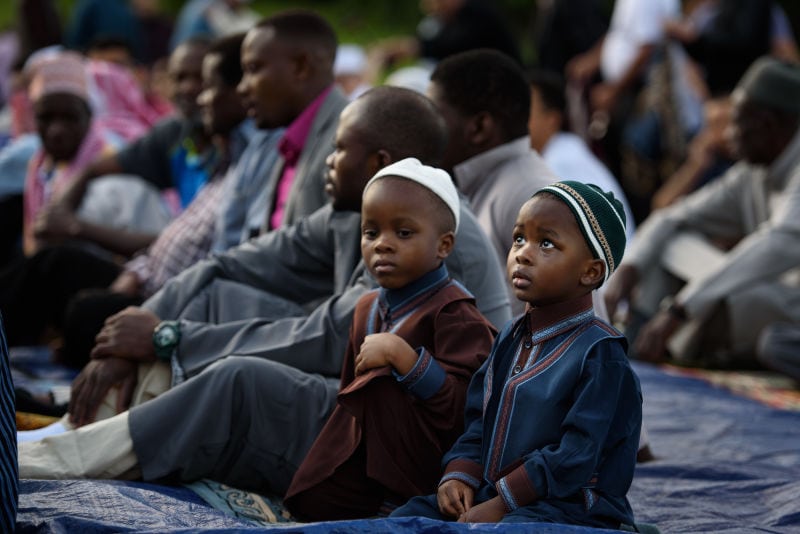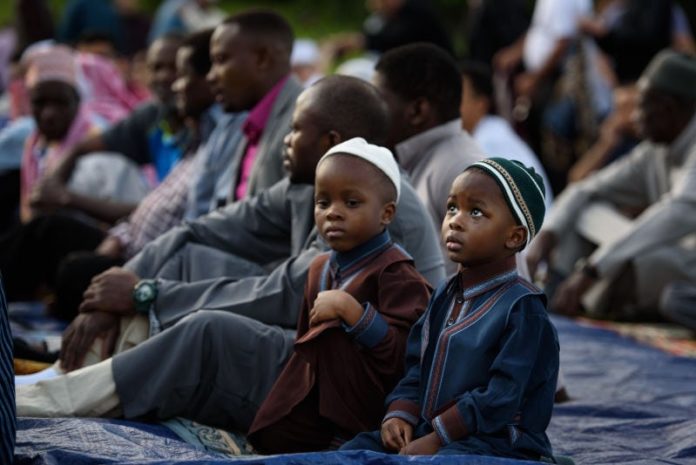
As a child, my mom would tell me stories about Ramadan in our homeland of Comoros. Some parts weren’t the most idyllic – the idea of fasting under mosquito nets without air conditioning that close to the equator is not my concept of pleasant by any stretch of the imagination.
The one part that I always envied, however, was the sense of community enshrouded in each story. The collective participation in the holy month made the air crackle just a little differently, and you could feel the nuance in every vignette. My mother would recount sharing the daily burden of preparing iftar dinner with her sisters, turning an gendered obligation into a space for them to exchange hopes and dreams and make dua for each other without the prying eyes of the rest of our families; the combination of sandalwood, turmeric, and burning wood wafting in the background. And then there’s the concluding Eid-al Fitr, the party to end all parties: days long, island wide, with henna, gifts and food from shore to shore, children celebrating their family members’ successful fasts with trinkets.
It’s a snapshot that I’ve only ever experienced by proxy, but have held onto tightly as if it was my own memory for the bleaker days during my own. The reality is, in practicing one of my most important faith traditions here in the United States, I often feel very invisible.
Every year I’m approached by a new friend or acquaintance in awe of my fast, impressed by my temerity to forego food or drink from the moments just before the crack of dawn until sunset. They mean well, so I let any rising annoyance go before reminding them that I am not some special warrior, just one of literally a billion people participating in a sacred tradition.
Abstaining isn’t as hard as you would think. Certainly, the first few days of stomach growls are endlessly distracting, but the human body is remarkably resilient and adjusts to the modified schedule quickly. In fact, in what I can only consider a macabre joke, intermittent fasting is a de rigeur diet trend. People are often surprised that I maintain a regular lifting schedule during the month, but so much of the month is predicated on discipline and faith that it would be weird for me not to.
What is difficult, however, is isolation. Most of our culture is socialized around interacting with food and drink, and not just in the Western world. 11 months out of the year, my mother wouldn’t let you step foot in her apartment without being greeted by some samboussa. But there is something vaguely effacing about how Muslims, especially Black Muslims, have to navigate Judeo-Christian and corporate food culture during Ramadan. There’s an inherent apologia that comes with having to decline an invite to a team lunch or a happy hour; a quick exhale of breath right before quickly having to explain your faith despite having a completely Arabic name. That potpourri of isolation and invisibilia, and navigating the politics that come alongside that both inside and outside our race and faith communities, requires so much more of my strength than waiting until 8:30 PM to have a glass of water.
In all the corporate spaces I’ve worked in, I’ve never been made aware of a safe space for Muslims to commune and engage during the holy Month. In all of the corporate spaces with Black community groups or resource groups, Ramadan has never been broached as a concern to my knowledge. That isn’t to say I’ve never been accommodated after making my practices clear; but it can, more often than not, come with a line of inquiry that requires more effort than it’s worth. Yes, I am Muslim. Yes, I have always been Muslim. No, I do not wear hijab like so-and-so, many Muslim women do not outside of prayer. Yes, water too. I know, you could never be able to do that.
So I stopped publicly divulging my fast unless absolutely necessary, pushing myself further into the margins between crescent moon sightings. In a world that doesn’t go out of its way to ask black women to speak up it wasn’t all that difficult. I resigned to the fact that my faith was my personal journey, and that if I was sent to the margins, I could annotate the edges with the stories of fellowship I had inherited from my mother and the women before me.
Fortunately my story doesn’t end there. While a lot of my upbringing denied me a social group of people who existed at my many intersections within my age group, black Muslim women have pushed the vanguard of social media, creating a coalition of marginalized identities with the freedom to showcase their range of self-expression of faith and devotion. Hashtags like #BlackoutEid, and #BlackMuslimRamadan, and are the culmination of a tradition of self-determination by black Muslims to have themselves seen in a space that is dominated by one visualization of Muslim identity, from the Halima Adens to the SZAs.
We’re in the final few days of Ramadan and in some ways it’s the easiest, because your stomach feels so small that you barely have an appetite despite not having eaten in 16 hours. It’s also when exhaustion can set in the deepest – like a lingering ache that you can’t shake, unfettered by your need to accomplish things throughout the day. Your reserves can easily be depleted and your existence constantly questioned, but still you persist, because that is what black Ramadan is about: it’s having who you are challenged, ignored, and defined for you, and reconstructing the margins until the page is irrelevant. And while I don’t have the same crackle in the air in Brooklyn as what wafts in from the Indian Ocean tides, I have developed a circle all my own, where we can share our own dreams and hopes, all courtesy of a hashtag.



